#enneagram childhood
Explore tagged Tumblr posts
Text
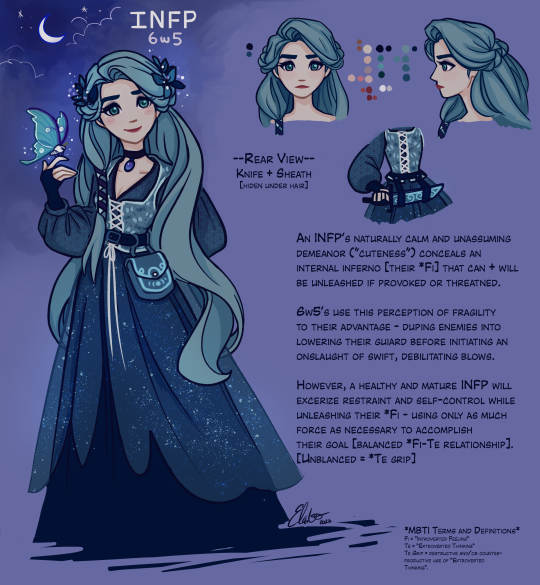
This is the final/touched-up version of the post I made a while ago, along with some story and character lore. I've been thinking hard about what kind of story I want to tell with this graphic novel since I really don't want to put my time and effort into something that isn't meaningful to me.
Story Time: I recently broke up with my INFJ boyfriend of 7 months this December. He was an immature INFJ and it was an unhealthy relationship where I was consistently neglected and my Fi ("Introverted Feeling"), including personal feelings, were not taken seriously or valued.
It was a necessary break-up, but it unearthed a lot of past trauma I was subjected to from *unhealthy* Fe ("Extroverted Feeling") users throughout my life. The realization of my resentment towards high Fe users has brought up a lot of mixed feelings, including both shame for hating Fe and fear of being rejected by it.
I hadn't known Fe to be anything but abusive or manipulative and I had believed firmly that I could never be fully embraced or understood by Fe users because I was too "dark", "depressing", or "anti-social" just for being myself and expressing my Fi.
That is, until recently...
(To be continued with my next post) ;)
#my infp life#mbti infp#portfolio 2023#enneagram#mbti#mbti fanart#mbti types#personal story#Fi and Fe#infp things#character design#character art#mbti comic#childhood trauma#complex ptsd#mental health#healing journey#infp 6w5#introverted feeling#extroverted feeling
56 notes
·
View notes
Text
childhood of enneagram types
📍Enneagram 8 : the challenger . ☆ . • ☆ . ° .• °:. *₊ ° . ☆



an E8 kid probably grew up in a dangerous environment or a violent household. Or even if they grew up in a normal household , very early in life they understood that the world is an unfair, unsafe place so meek, weak people don't make it; the thing that matters the most is survival. As a kid they might have felt like it's not okay to feel pain, be weak & vulnerable. It's likely they were betrayed by an adult figure and came to believe that people can't be relied on. They were adventurous kids & frequently got into trouble , when they were punished for it( sometimes unfairly) the kids defended themselves, they fought back, they felt like if no one defends them then they themselves will. This E8 kid was the black sheep or scapegoat child of their family. Just like E1 kids they were forced to grow up quickly. The more rejection they faced as kids the more they hardened their hearts. The innocence of a kid was lost very early. Mostly it's the betrayal, unfairness & rejection they experienced in childhood. The child knew the world is cruel , in order to survive you have the protect your feelings, be bold & assertive. It's likely they lacked protection, even they were a small child they liked to see themselves as big & powerful to defend themselves against it. Growing up the E8 child might felt like one day they will avenge the unfairness they were experiencing.
#personality types#enneagram#psychology#enneagram 8#mbti#tritype#typology#estp#istp#16 personalities#enneatypes#childhood#family dynamics#inner child#psychoanalysis#psychoanalyzing
133 notes
·
View notes
Text
Cobra Kai Characters' and their Enneagram types
I love Cobra Kai so much and enjoyed SEASON 6 as well so I decided to write out their potential Enneageam types.
Now I want to be clear that this is my opinion, so you might not agree with me, but I still hope that this post will be helpful and you will enjoy it as well.
Enneagram 1 (The Reformer)
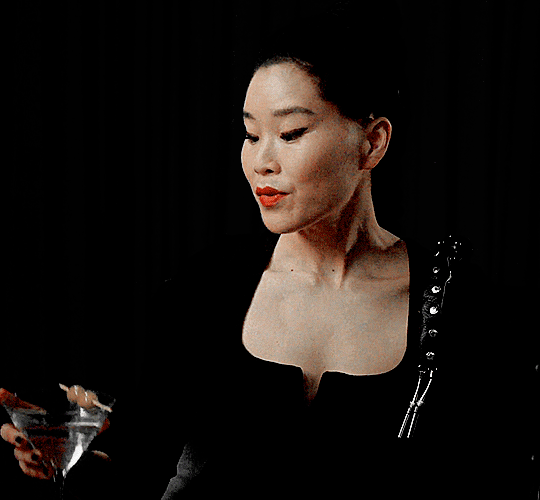
The Reformer are individuals that have a strong desire to be good and their core fear is being bad/wrong. This type is in the gut triad, because they have instinctual energy, and their dominant emotion is anger, but they repress it. These people are critical, hardworking, principled, organized, honest, and absolute perfectionists.
The reason they are like that is because in their childhood, they learned that it wasn't okay to make a mistake. Psychreel.com states, "Enneagram One as children felt harshly criticized, punished, or inadequate. It’s possible that the household rules were incongruent. As a result, they grew preoccupied with being perfect and avoided making mistakes in order to escape being judged. “You should always strive to be better than you really are,” was the main theme."
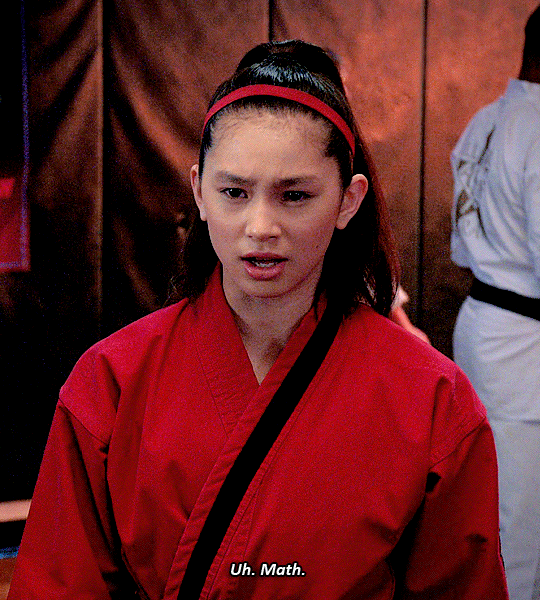
Kim Da-Eun, Devon Lee, Chozen Toguchi and John Kreese are definitely Reformers. Now I know it seems strange that John Kreese, Kim Da-Eun, Chozen Toguchi or Devon Lee would be a Reformer but when you consider some hints that they throw out, you can see it. For an example, Kim Da-Eun always speaks on being absolutely perfect, Devon Lee mentioned that she strives to not make the same mistake twice, Chozen always speaks about having honor, and John Kreese always talks as if his way is the right way.
I also want to mention that all of them have always shown to be calm and collected unless provoked and they show a desire to want to do the right thing as well. As an example, Devon felt very guilty about unintentionally humiliating Kenny until she finally confessed to him about what she did or even how Kreese readily defends others like Terry Silver, his late girlfriend Betsy, Tory and Kim when they were in danger or abused.
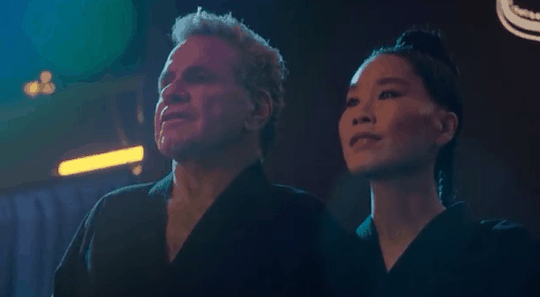
(I couldn't get a gif of Chozen Toguchi, it won't let me add another gif)
Enneagram 9 (The Peacemaker)
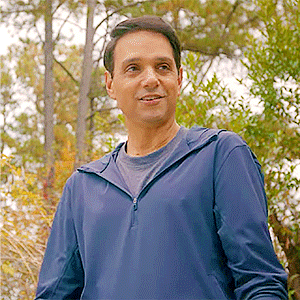
The Peacemaker are individuals that have a core desire to create inner peace and harmony with themselves and the world around them. Meanwhile, their core fear is being in conflict, tension or feeling shut out and losing connection with others. The Peacemaker also has instinctual energy and their dominant emotion is anger but they numb themselves to it until they lash out. These people are creative, supportive, empathetic, and very accepting.
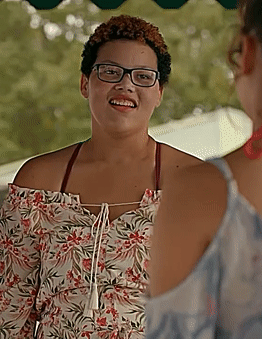
The reason why they're very accommodating is because in their childhood they learned that it wasn't okay to assert themselves and that their presence or opinions didn't matter. 9wing1.com states, "They fear that if they express their opinions or needs, they will be rejected and cause conflict. This fear can lead to a tendency to avoid confrontation and merge with others' opinions and desires. They doubt their ability to assert themselves and often feel overlooked or ignored."
Daniel LaRusso, Aisha Robinson and Moon are definitely Peacemakers. There are multiple times that they tried to de-escalate tense situations because they want to keep the peace with others. I also noticed that Daniel, Aisha and Moon are initially welcoming towards others, and even forgiving towards people who have wronged them as well.
Now, Moon has shown to merge with her friend Yasmine and she also appears passive but she also is very friendly, sociable and accepting. Meanwhile, Daniel and Aisha have shown to have a temper, however Aisha will confront the issue and Daniel will try to avoid it until he lashes out.
All in all, they definitely display the traits of the Peacemaker.
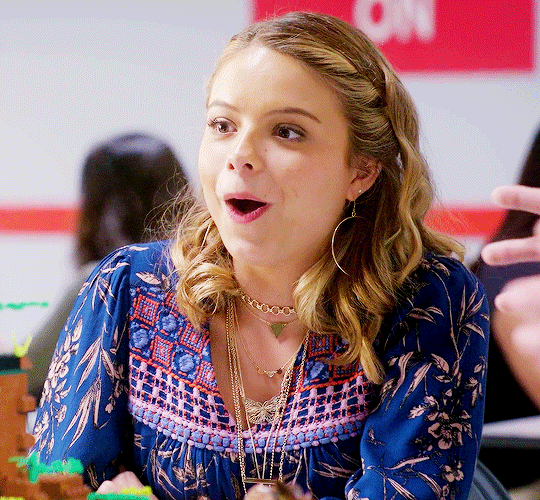
Enneagram 8 (The Challenger)
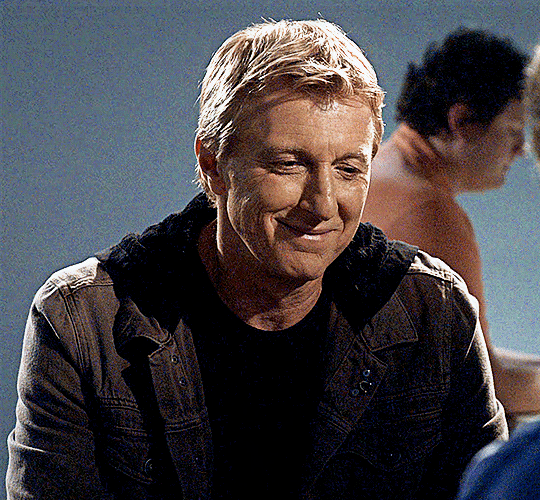
The Challenger are individuals that have a desire to be strong in order to guard against injustice. The core fear of a Challenger is being vulnerable or powerless because they fear being controlled. The Challenger also has instinctual energy so they dominantly feel anger, but compared to the other members of the Gut Triad, they are more in tune with their anger and more willing to express it. These people are confident, strong, protective, inspiring, independent, and confrontational.
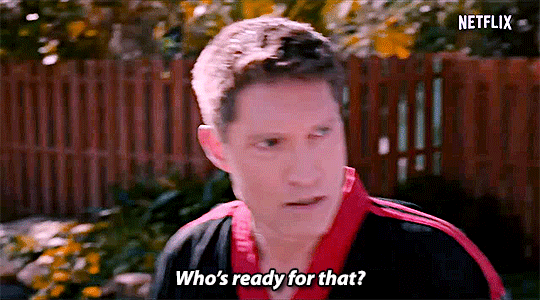
The reason these people become Challengers is because in their childhood they learned it was never okay to let their guard down. Enneageamgift.com states, "Eights bear a childhood wound originating from insecure relationships with parental figures ... This instability propels Eights to adopt the role of the protector, compensating for the absence of guidance and positive leadership."
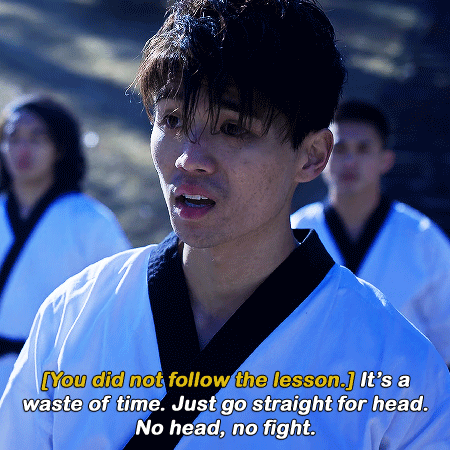
The Challengers are definitely Tory Nichols, Mike Barnes, Kwon Jae-Sung and of course Johnny Lawrence. There are multiple times that these people showed the traits of the Challenger like how all of them are rebellious which shows the fear of being controlled. They are also very intimidating as well because of their temper but their anger has led to them getting into trouble.
They also struggle with being vulnerable especially Tory, but they later on learned to overcome that. Sadly, Kwon never got the chance to reach that point in his life, but he definitely showed strong traits of The Challenger like the others for this type.

I'm going to make a Part 2 for the other characters. I hope this was informative too and interesting too!!
8 notes
·
View notes
Text
Childhood of enneagram types
type 1 : the reformer
type 2 : the helper
type 3 : the achiever
type 4 : the individualist
type 5 : the investigator
type 6 : the loyalist
type 7 : the enthusiast
type 8 : the challenger
descriptions by @lilmeawmeawblog
2 notes
·
View notes
Text
finding people with similar interests to me is so fucking important and heartwarming and i feel so cyiwhwvdjwnaksjs and-
#“so that's the enneagram 4 thing that happened to you” yeah i wouldn't say anything but i couldn't resist lol#i'm a social four so#finding my “people” was my goal since childhood#ofc they can't be TOO similar or i'll feel like i got my identity stolen 😑#“yeah we know that we got it when you said you were a four” good to know#am i finally going to make a friend?? who knows#probably not based on the past#but who knows
2 notes
·
View notes
Text
ultimate character development template
basics
name: meaning of name: nicknames/titles: age: gender: location: birthday: strengths + example where it's shown: weaknesses + example where it's shown: how it affects others:
emotional depth
attachment style + how it manifests in the story: physical fear: emotional/abstract fear: happy memory: sad memory: object of significance: philosophical outlook/belief: what characters are ignorant about themselves: how confident are they: goal: long-term dreams: what they're embarrassed/ashamed to tell others about: regrets: source of pride: source of misery: what they admire above all else: do they believe in fate:
personality
mbti: enneagram: big five: character archetype: star sign: who they pretend to be on the outside: who they actually are/how they feel towards the mask: mental health conditions: how it manifests for them: iq: eq: humour: reputation:
habits
bad habits: mannerisms when stressed: mannerisms when content: mannerisms when scared: mannerisms normally: verbal mannerisms/distinctive speaking style: how do they move across a room: what do they say and what remains unsaid: how they express love: hobbies:
appearance
defining features: eye shape + colour: hair texture + colour: skin texture + tone: vibe: height: build: clothing: any bodily disfigurement (scars, etc.): overall attractiveness: their opinion on their appearance: appeals to:
relationships
who they trust most: what they wish they could do for them: what's holding them back: who they hate most: what they wish they could do to them: what's holding them back: relationship with the protagonist: relationship with the antagonist: siblings: relationship with them: parents/step-parents: relationship with them: previous broken relationships: why did it break: what others expect of them: who believes in them: their mentor character/who they look up to: political/religious/other affiliations: what makes them different from every other character: non-human relationships + why: romantic "type" + why: relationship dynamics:
backstory/background
primary emotion towards their past: primary feelings while in their past: where did they grow up: defining incidents: earliest childhood memory: saddest memory: happiest memory: major accomplishments: their opinion on it: notable people in their backstory: effect on them today: trauma: what have they already lost: financial circumstance:
progression
why are they important (eg. why're they the only one able to do something?): what do they learn about themselves throughout the story: what do they learn about the world: how do they feel towards their newfound knowledge: character arc (positive, negative, neutral): how relationships change because of their actions: what mistakes do they make: what scene is their character highlighted: do they get what they want: why or why not: what happens to them after the story ends:
#character development#creative writing#writeblr#writing ideas#writing#writblr#character design#character description#character template#writing help#writing advice#character sheet#writerscommunity#writers on tumblr#writers and poets#writer stuff#ao3 writer
12K notes
·
View notes
Text
A Heart Devoured (AHD) : A Dark Yandere Anthology

Step into a world of dangerous devotion and forbidden desires. A Heart Devoured is a collection of hauntingly seductive one-shots and imagines, each exploring the intoxicating grip of male yanderes. From possessive protectors to manipulative masterminds, these stories dive deep into the dark allure of obsession, blending romance, horror, and suspense.
Whether you crave a lover who would burn the world for you—or one who would chain you to it—this anthology delivers raw passion and chilling intensity that will leave you breathless and craving more.
You are their everything. Escape, if you dare.
Warning: These husbands take "forever" seriously.
────────────
Note: Want to make a LONG request for original yanderes (OC's)? Read the Rules and Regulations, first, before requesting. Failure to abide by the rules will have your request ignored and deleted.
▃▃▃▃▃▃▃▃▃▃▃▃▃▃▃▃▃▃▃
♡ For Reader-Inserts. I only write Male Yandere x Female (Fem.) Reader (heterosexual couple). No LGBTQ+:
♡ ⭐. Author's Personal Favorites. ♡ 🔞. NSFW / extremely explicit themes (non-con, sexual torture, dangerous edge play, degradation, humiliation, BDSM, etc.)
♡ Schedule. The following stories are released or scheduled for release:
Table of Contents

Yandere! Alpha! Wolf Hybrid & Little Omega
Drabbles
“You look prettier when you cry.”
“Do you know what I love most about you?”
“You don’t get to decide anymore,”
“And treasures don’t get to escape.”
“You’re waiting for someone to come for you, aren’t you?”
“Cry for me,”
“But don’t worry, darling. I’ll fill it with something better. Me.”
“You’ll only ever have one choice with me,”
Novelette 1 : Marked and Mated
🔞Run all you want, little omega—I love the chase.

Yandere! Chief of Police & Dollface
Headcanons
The sirens wailed, but no one was coming for you—they were his, just like you are now.

Yandere! College! Bully & Loser
Details: MBTI - INFJ ; Enneagram - 8w7
Oneshots
The worst part? You’ve stopped trying to fight it.
Novella 1 : Torn Between Us
In a world where no one cares, he’s the one who notices you… and that’s frightening.
Trust no one. Not even yourself.
🔞Part 3
🔞Part 4

Yandere! Criminal Prosecutor & Pet
Drabbles
“Soon, you won’t even remember what freedom tasted like.”
"Kneel. Now."
Oneshots
“This isn’t an interrogation. It’s a love story—you just don’t know it yet.”

Yandere! Divorce Attorney & Church Girl
Headcanons
In his world, love isn’t a choice—it’s a life sentence.
Novella 1 : Skin of the Saint
He didn’t believe in love, but she made him question everything.
She was everything he despised, and yet he kept returning.
She lived for her God; he lived to see her fall.
⭐He couldn’t touch her purity, but he could burn everything around her.
He wasn’t your savior, but he would break you like a sinner.
His love was a sin, but sins could be absolved—couldn’t they?
A stolen kiss, a forged marriage, and a choice that would ruin more than just your life.
🔞He kissed her like a punishment, touched her like a prayer.
Novelette 2 : Angels Cry, Devils Burn
Angels Cry, Devils Burn 1

Yandere! Emperor & Little Dove
Details: MBTI - ENFJ ; Enneagram - 8w7
Drabbles
“Do you know why I haven’t kissed you yet?”
“Do you like it?”
Headcanons
"I burned their world for daring to look at you—imagine what I’d do if you tried to leave."

Yandere! Ex-Boyfriend & Cheating Bitch
Details: MBTI - ENTP ; Enneagram - 7w8
Drabbles
“You disobeyed me. Again.”
“Miss me?”
“Pray I don’t snap. Because if I do, you won’t survive it.”
Novella 1 : Friction & Fire
She wasn't looking for love, but love wasn't asking for permission.
Some truths are better left buried.
Part 3
Part 4
Part 5
Part 6

Yandere! FBI Agent & Sweets
Oneshots
He knows your favorite color, your childhood fears, and how you’ll look in a coffin.

Yandere! Hitman & любимая {darling}
Oneshots
“You should’ve pulled the trigger when you had the chance.”

Yandere! Hockey Captain & Ice Princess
Oneshots
You skate for freedom, but he’s about to make you his trophy.

Yandere! Isekai! Knight & Little Mouse
Details: MBTI - ENTJ; Enneagram - 8w7
Headcanons
What happens when a hero's love turns into an obsession that even he can't control?
Oneshots
In his eyes, your defiance isn’t strength—it’s foreplay.

Yandere! Marine Corps & Good Girl
Details: MBTI - ISTP ; Enneagram - 6w5
Oneshots
He crushed a man’s skull beneath his boot and turned to you with a smile.
"You’ll never escape me—not when I’m the only one keeping you alive."

Yandere! Nerd & Little Sugar
Details: MBTI - INTJ ; Enneagram - 6w5
Drabbles
“You think this is a game?”
Oneshots
No one else noticed the quiet boy in the corner, but he’s all you’ll notice now.

Yandere! Owner (?) & ???
Oneshots
Sold to the highest bidder—your nightmare begins now.

Yandere! Painter & ???
Drabbles
"You like testing me, don’t you?"

Yandere! Prison Warden & Fuckin' Filth
Oneshots
In this prison, there are no rules—except for his.
The rules are simple: obey, or suffer. And you’ve already broken every single one.

Yandere! Professional Gambler & Doll
Headcanons
He’s the last bet you’ll ever make—and the one you’ll never walk away from.
Yandere! Reverse Harem & Rape Slave
Novella 1 : Killer Charm
🔞Killer Charm 1
🔞Killer Charm 2
🔞Killer Charm 3
🔞Killer Charm 4

Yandere! Russian! Mafia Boss & Wife
Details: MBTI - ENTJ ; Enneagram - 8w7
Novelette 1 : The Enemy In His Bed
⭐️🔞"I trusted you, wife, and now I'll teach you what betrayal feels like."

Yandere! Spanish Pirate Captain & Mi Tesoro {treasure}
Novelette 1 : El Capitán's Tesoro
🔞When the Capitán says you're his treasure, he means it—he’ll spill blood, even yours, to keep it.

Yandere! Stalker & ???
Oneshots
The man in your apartment knows you better than you know yourself.

Yandere! Sugar Daddy & Sugar Baby (?)
Drabbles
“You didn’t think I’d let you leave after the vows, did you?”
“What the fuck was that?”
Headcanons
⭐You’ve never feared a kiss before, but his feels like a loaded gun.
Novella 1 : Bye, Bye, Bye
In his world, sugar babies don’t get to keep secrets.
He gave you everything, but all you gave him was distance—and it was driving him mad.
The rules were clear: no emotions, no questions, no attachments—until he broke every single one.
Jealousy is a fire, and he’ll burn anyone who gets too close.
🔞He’s not just your sugar daddy—he’s a sadistic master who won’t let you go.
When devotion turns to madness, no one is safe—not even the one he loves.
Novella 2 : Money, Money, Money
Money, Money, Money 1

Yandere! Vigilante & Sweetheart
Headcanons
"I’ll burn the world if it means keeping you warm in the ashes."
He’d rather destroy you than let someone else touch you—because if you’re not his, you’re nothing.
Oneshots
He’s the savior of many—but your destruction is his true mission.

Yandere! Volleyball Captain & Babe
Oneshots
“They all warned you about me, didn’t they? But you just couldn’t stay away.”

Yandere! Zombie Apocalypse! Survivor & Little Prey
Details: MBTI - ISTP; Enneagram - 8w7
Drabbles
“No, I’d rather keep you. Watch you squirm. Hear you beg.”
Oneshots
⭐️In the world of the dead, he was the only thing keeping you alive—and tearing you apart.

If you want to be added or removed from the tag list, just comment on this post. Thank you.
General TAG LIST of “A Heart Devoured”: @definetlythinkimanalien , @floooring , @lilyalone , @theogborjie , @ne7zach , @songbirdgardensworld , @imnotabot28 , @ncsltgic , @aishiyaa , @scotchhopin , @queenmimis , @yandreams-storageblog
❤︎ Fang Dokja's Books.
♡ Book 1 [you are here]. A Heart Devoured (AHD): A Dark Yandere Anthology ♡ Book 2. Forbidden Fruits (FF): Intimate Obsessions, Unhinged Desires. ♡ Book 3. World Ablaze (WA) : For You, I'd Burn the World. ♡ Book 4. Whispers in the Dark (WITD): Subtle Devotion, Lingering Shadows. ♡ Book 5. Ink & Insight (I&I): From Dead Dove to Daydreams. ♡ Library MASTERPOST 1. The Librarian’s Ledger: A Map to The Library of Forbidden Texts.
♡ Disclaimer. Not all stories are included in the masterpost due to Tumblr’s link limitations. However, most long-form stories can be found here. If you're searching for a specific yandere or theme, this guide will help you navigate The Library of Forbidden Texts. Proceed with caution—these tales explore obsession, madness, and devotion in their rawest forms.
#masterlist#yandere x reader#smut x reader#yandere imagines#smut#yandere smut#yanderecore#yandere headcanons#yancore#yandere male#male yandere#yandere x you#yandere oneshots#male yandere x reader#yandere boy#yandere scenarios#yandere drabble#yandere male x reader#yandere x darling#yandere#obsessive yandere#possessive yandere#tw yandere#yandere blog#yandere romance#yandere oc#smut fanfiction#shameless smut#smut writing#yandere boyfriend
980 notes
·
View notes
Text
✨ * ― 𝙀𝙓𝙏𝙀𝙉𝙎𝙄𝙑𝙀 𝘾𝙃𝘼𝙍𝘼𝘾𝙏𝙀𝙍 𝘽𝙄𝙊𝙂𝙍𝘼𝙋𝙃𝙔 / 𝙎𝙏𝘼𝙏𝙄𝙎𝙏𝙄𝘾𝙎 𝙏𝙀𝙈𝙋𝙇𝘼𝙏𝙀 !
The Character Development Template is a comprehensive tool for creating detailed and well-rounded character profiles, ideal for writers, roleplayers, or anyone exploring character creation. It covers essential details like identity, personality traits, relationships, and background while diving deeper into habits, quirks, and beliefs. Additional sections include alternate universes, scenario-based questions, and a variety of fun, introspective prompts to uncover hidden aspects of your character. The template also provides space to list inspirations from media, historical figures, and quotes, making it a versatile resource for building dynamic, multidimensional characters.
I. BASIC INFORMATION
Full Name:
Nickname(s):
Pronunciation:
Reason/Meaning of Name:
Preferred Name(s):
Titles:
Date of Birth: (Month, Year)
Place of Birth:
Age: (e.g., 20s, 30s)
Zodiac Sign:
Gender Identity:
Pronouns:
Sexual Orientation:
Romantic Orientation:
Species:
Ethnicity:
Nationality:
Living Arrangements:
Occupation:
Primary Source of Income:
Secondary Source of Income:
Education Level:
Religion:
Political Affiliation:
Social Class:
Dialogue Style:
II. PERSONALITY
Positive Traits:
Neutral Traits:
Negative Traits:
Primary Vice:
Primary Virtue:
Greatest Fear:
Greatest Desire:
Motivations:
Core Values:
Sense of Humor:
Strengths:
Weaknesses:
Quirks:
Pet Peeves:
Life Philosophy:
Jung Type:
MBTI Personality:
Enneagram Type:
Temperament:
Moral Alignment:
Hogwarts House:
III. RELATIONSHIPS
Mother:
Father:
Siblings:
Children:
Significant Other(s):
Best Friend(s):
Rival(s):
Enemies:
Pets:
Other Important Relationships:
IV. BACKGROUND
CHILDHOOD
Place of Birth:
Hometown:
Socioeconomic Status:
Parents' Occupations:
Type of Childhood:
TEENAGE YEARS
Key Relationships:
Education Level:
Significant Events:
ADULTHOOD
Current Residence:
Notable Life Events:
V. HABITS & QUIRKS
Daily Routine:
Nervous Tics:
Unhealthy Habits:
Peculiarities:
VI. ALTERNATE VERSES/THEMES
Verse 1 (Description):
Verse 2 (Description):
Verse 3 (Description):
VII. ADDITIONAL CHARACTER QUESTIONNAIRE
PERSONAL INSIGHTS
What would they say is their biggest flaw?
What is actually their biggest flaw?
What is their biggest blind spot?
What is their guilty pleasure?
How do they act out when stressed?
What makes them envious?
What is one thing they wouldn’t want someone to know about them?
What is their biggest nightmare?
What was their worst subject in school?
What makes them feel insecure?
What are two things that make them uncomfortable in conversation?
SCENARIO QUESTIONS
What would they do if they knew they couldn’t fail?
Name three things they are grateful for.
When was the last time they did something for the first time?
What is something they wish they could redo from the past?
Describe a memory that makes them feel proud.
What’s in their bag/pockets?
Are they proud of who they are? Name an achievement they value.
What do they notice first about someone?
Do they value creativity or practicality more?
Describe a time they did something despite being scared.
What is their favorite gift they’ve received?
How old do they feel on the inside, and why?
Do they feel they’ve missed opportunities they regret? Describe one.
VIII. BELIEFS & OPINIONS
What is their idea of perfect happiness?
What is their greatest fear?
Which trait do they most deplore in themselves?
Which trait do they most deplore in others?
Which living person do they most admire?
What is their greatest extravagance?
What is their current state of mind?
What do they consider the most overrated virtue?
On what occasion do they lie?
Which living person do they most despise?
When and where were they happiest?
Which talent would they most like to have?
If they could change one thing about themselves, what would it be?
What do they consider their greatest achievement?
Where would they most like to live?
What is their most treasured possession?
What do they regard as the lowest depth of misery?
Who is their hero of fiction?
Who are their heroes in real life?
What do they most value in their friends?
What is their motto?
IX. MISCELLANEOUS QUESTIONS
What is their favorite word?
What is their least favorite word?
What sound or noise do they love?
What sound or noise do they hate?
What is their favorite curse word?
If they were reincarnated as a plant or animal, what would it be?
If Heaven exists, what would they like to hear God say when they arrive?
What profession would they most like to attempt?
What profession would they not like to do?
X. INSPIRATION
TV Character(s):
Movie Character(s):
Book Character(s):
Song(s):
Historical Figures:
Quotes/Poetry:
Other Media Inspirations:
263 notes
·
View notes
Text
I have an obsession with assigning theme songs to characters I like. Since Linked Universe is my current hyperfixation I realized I have a golden opportunity. Sleeping at Last is one of my favorite artists and he has an album called Enneagram. 9 songs for 9 personality types for 9 Links so without further adieu here is my totally flawed assignment of songs.
One - Warriors.
The list goes on forever Of all the ways I could be better, in my mind As if I could earn God's favor given time Or at least congratulations Now, I have learned my lesson The price of this so called perfection is everything I've spent my whole life searching desperately To find out that grace requires nothing of me
In the Swords comic Warriors admits that wielding the Master sword made him feel invincible and that nearly cost him his life.
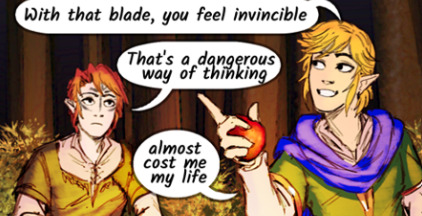
Now Warriors has learned that his true strength is his ability to work with others, a strength he brings to the chain. I see Warriors as someone that likes rules, he needs the world and people to follow a predictable pattern. That puts him at odds with the chaotic members of the chain (That’s everyone, including Warriors.) He’s a perfectionist, specifically the type of perfectionist that believes if you want something done right you’ve got to do it yourself. He’s learned to work with others, and has overcome his initial instincts as The Hero.
Two - initially I thought Hyrule was the best match for Two but as I was writing this analysis I changed my mind to Twilight.
Sweetheart, you look a little tired When did you last eat? Come in and make yourself right at home Stay as long as you need Tell me, is something wrong? If something's wrong, you can count on me
You know I'll take my heart clean apart if it helps yours beat
Twilight is running himself ragged. He was pulling double duty as Wolfie and Twilight. He’s trying to make Time proud, then turns around and tries to mentor Wild. A thankless task because Wild is not interested in his mother Cuccoing. He's more used to the mature blue eyed wolf that pushed him to his limits and never coddled him.
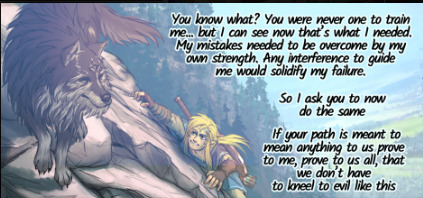
And in Twilight Princess he became The Hero to save his village. Mayhaps Twilight is a bit of a people pleaser but…
I know exactly how the rule goes Put my mask on first No, I don't want to talk about myself Tell me where it hurts I just want to build you up, build you up Till you're good as new And maybe one day I will get around to fixing myself too
Twilight recently had his heart broken when Midna left and shattered the mirror. Maybe he’s trying to avoid those feelings by concentrating on everyone else?
Three - Time and Legend were fighting back and forth with songs Three and Eight. Those two are very similar . Both young hero’s that had their childhood stolen in a single defining moment. Legend watched his uncle die and went on the run. Time drew the sword and woke up seven years later having slept through his childhood. And they’ve become pessimistic and cynical because of that.
And a nice little detail that shows how similar Time and Legend are is when Legend and Warriors were betting on who Time’s wife was. War’s thought it would be the princess. But Legend correctly guessed it was someone different because he knew that wasn’t Time’s style.
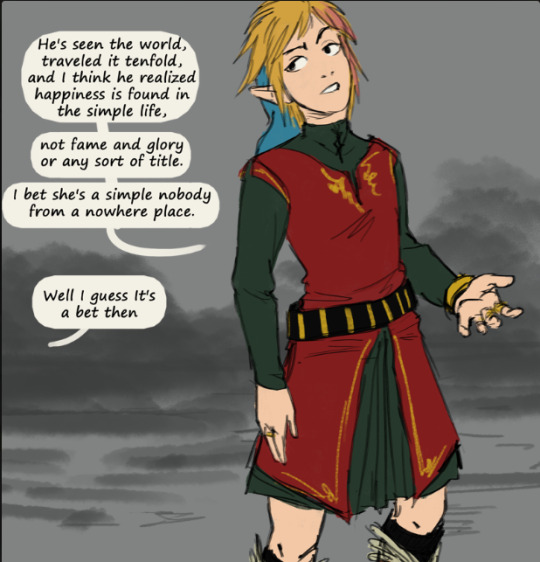
But back to Time, because these two are different and maybe that just because Time has the advantage of years and age on his side but he settled in a way Legend hasn’t
Maybe I've done enough And your golden child grew up Maybe this trophy isn't real love And with or without it, I'm good enough
Time is who he is because he has Malon and the ranch. Malon loves the very normal man Time is not The Hero he had to be. The others immediately notice how different Time is when they get to the ranch.
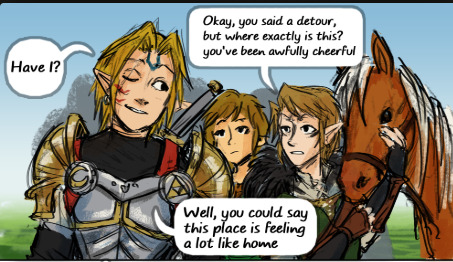
He laughs, smiles, and jokes around. While on the road he’s tense and serious. He sees this quest as a duty and a responsibility, but he wants to be home. Makes you wonder why he’ll leave home and die to become the hero’s shade?
Four - Is FOUR
Jk jk it's Sky. The song Four is about ordinary touching divine. And if that doesn't sum up Sky I don't know what does.
Bodies fashioned out of dirt and dust For a moment, we get to be glorious
When Sky first encountered Demise the Demon King spends a lot of time pointing out that Link is human, brave for a human but still human.
Then there are these lines
But I've fallen in love with a ghost I lost my balance when I needed it most
He loves Zelda, a mortal incarnation of a goddess and in his quest to save her he is so often just a little too slow. He's there in the end and gets the job done but it's a close thing that haunts him.
Five - For real this time. This is Fours song.
The opening lines are
I want to watch the universe expand I want to break it into pieces small enough to understand And put it all back together again In the quiet of my private collection
He's a curios little guy and a smith. Always looking into the mysteries of the world, take them apart and remake them. Maybe that curiosity got him into a little trouble. He's got the four sword and one magic sword is more than enough for him.
The last lines of the song are
I finally feel the universe expand It's hidden in heartbeats Exhales and in the hope of open hands
Four has got the four sword but he is also the hero of Minish cap. He see's the large universe and the small important things that are closer to home. He's recognized this after the events of sunset and dawn. If this quest is to succeed he needs to let his brother's in. Wild knows his secret but that was more of a spur of the moment angry reaction. I'll be interested to see if he purposefully reveals his secret to anyone else.
Six - Six was originally my pick for twilight but I switched him and Hyrule. Fanon characterizes Hyrule as the healer but so far we've only seen him healing once. So I'm basing this off of his games, Linked universe canon and my hopes for his character arc.
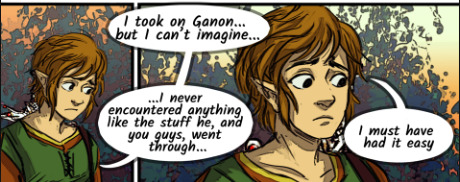
We laugh about this line because Hyrule has what is considered the hardest game. Oh you sweet summer child. You complicated, pixilated little hero. Do you know what you've done? That's why I associate these lyric's with Hyrule's character
I want to take shelter, but I'm ready, ready to fight Somewhere in the middle, I feel a little paralysed Maybe I'm stronger Than I realize
Like Legend Hyrule lives in the fallen hero timeline. That's caused some serious problems for his kingdom. But unlike Legend, Hyrule seems to be open and friendly.
Is it courage or faith To show up every day? To trust that there will be light Always waiting behind Even the darkest of nights
It takes real courage to live in a dying world and still love it and it's people.
Seven - There was never any doubt in my mind that Seven was Wild's song. Some of these were difficult to nail down but not Seven and Wild. This song is about being restless and wanting to explore. Perfect for our Hero of the Wild
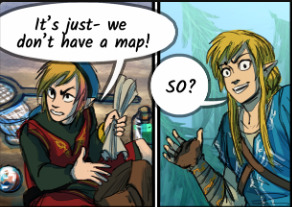
Then the song hits you with this sucker punch
But I want to be here Truly be here To watch the ones that I love bloom And I want to make room To love them through, and through, and through, and through The slow and barren seasons, too
Twilight has pointed out the Wild should talk to his Zelda about who he used to be and who he is now. But that means looking to the past and he's can't bring himself to do that yet. Instead seeing his life as two different people. The before and after.
Eight - I mentioned that I flipped flopped on choosing Time or Legend for this song but I finally decided that this is more Legend's song. Truth be told Eight could have been just about any Link's song. It's such a protagonist song. It's my favorite :)
Jojo has draw a picture of Legend with Marin and he looks so happy and playful. Something we don't see with the group.
But I can't let you see all that I have to lose All I've lost in the fight to protect it I can't let you in, I swore never again I can't afford to let myself be blindsided
He was open and loved once before but then he lost it. Not only lost it but had to be the one to destroy it himself, confront that maybe this happiness was never real to begin with. Now he's withdrawn and cynical. Legend is still all in on being a hero. (Unlike Time he's not looking to settle down.) But he wont be opening his heart anytime soon.
Can we talk about this panel from the bet
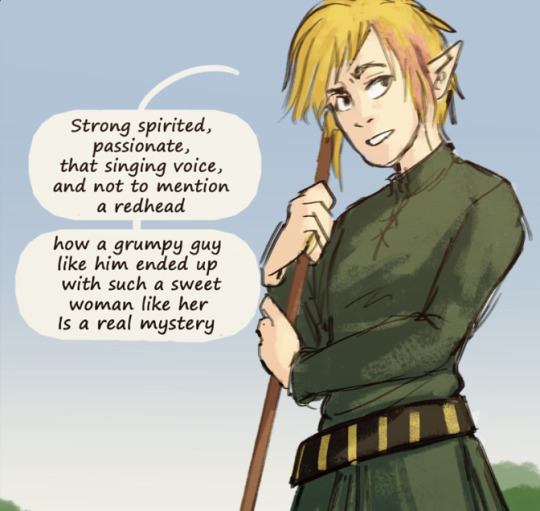
Are you talking about Time or yourself?
I'm standing guard, I'm falling apart And all I want is to trust you Show me how to lay my sword down For long enough to let you through
I can't wait to see his brother's break through that hard exterior and see the kind and empathetic person underneath. We see flashes of it.
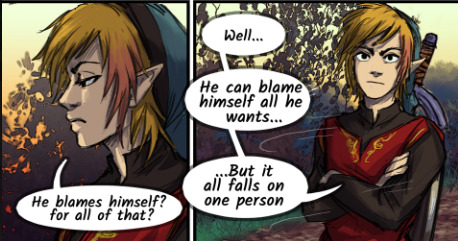
(Memories is a gold mine for everyone's characterization, just saying.) He's emotional mature enough to know where to really lay the blame. I hope he can help Wild see that. But I think to really get through to Wild he'll need to be emotional vulnerable and he's not prepared for that yet.
But in the end Legend is a hero through and through. Since he was 11 he's been The Hero and he shows no sign of stopping.
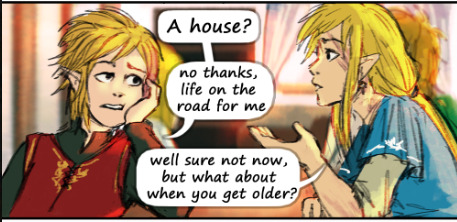
I'ma shake the ground with all my might And I will pull my whole heart up to the surface For the innocent, for the vulnerable And I'll show up on the front lines with a purpose
He's grumpy and cynical but still a hero.
Nine - By process of elimination Wind is number Nine. I'm not really happy with this one but none of the songs really fit Wind . So I decided to speculate about Wind's future. Wind and Tetra are supposed to reestablish the Kingdom of Hyrule, a daunting task for a 13/14 year old. No wonder he admires the kings of Hyrule so much
Wake up Fall in love again Wage war on gravity There's so much Worth fighting for You'll see Another domino falls Either way
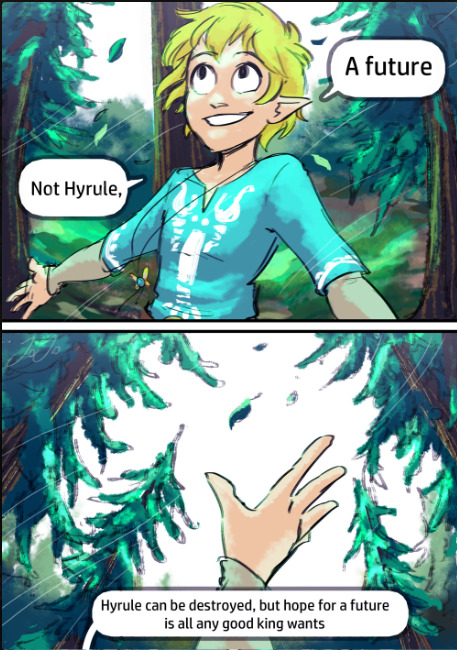
Quite the opposite of Wild , Wind is always looking to the past to build the future.
This ended up being longer than I thought it would be but I also didn't even talk about half my feeling when it comes to this album and Linked Universe. IDK how that possible. But I've said enough and I just needed to share my thought. And you guys should totally listen to the album.
#linked universe#lu warriors#lu twilight#lu time#lu sky#lu four#lu hyrule#lu wild#lu legend#lu wind#sleeping at last#song analysis#enneagram
74 notes
·
View notes
Text
charles and edwin's enneagram types
ok so I’ve been seeing a lot of really good analysis on charles and edwin’s internal motivations and how they tend to react to difficult situations. I’ve also had a deep interest in the enneagram for several years, and I just started reading a book about it, and my brain immediately connected it to DBD. so here are my thoughts on what charles and edwin’s enneagram types might be, how this influences many different aspects of their personalities, how their types complement each other really well, and how they’ve supported each other to be the best versions of their true selves.
What is the Enneagram?
More than just a personality type, the nine types of the Enneagram describe the “basic archetypes of humanity’s tragic flaws, primary fears, and unconscious needs.” Most Enneagram authors agree that we are born with a dominant type, and that this type “determines the ways we learn to adapt to our early childhood environment.”
The types are not static — there are different “levels of development” that describe how each type behaves when they are psychologically healthy or unhealthy. There is also something called the direction of integration/disintegration — each type behaves like another type when they are under stress or in growth (e.g. type Nines behave like Sixes when they are stressed, and Threes when they are in growth). So two people with the same type may not behave the same way as each other, and a person throughout their own life may grow and change, but they will still align with that dominant type.
All this to say, the Enneagram is a really useful tool for self-understanding and for having empathy for yourself and others, because it gives a lot of insight into a person’s core fears and underlying motivations.
charles - type nine
A big part of Charles’s character arc in season one was the repression and denial of his own anger. This was the biggest clue for me that he might be a type Nine.

There are so many examples of this, especially in episode 4:
the scene with Charles and Crystal on the lighthouse where they talk about the events of the devlin house (Crystal: Charles, could we just for one second talk about what happened? Charles: Crystal, I don’t have anything else to say. yes, that guy was horrible. yes, my dad was horrible. yes, I got angry. now I’m fine. Crystal: you don’t have to keep things bottled up)
the scene (1) when Charles is upset that Edwin hid the fact that he saw the cat king again, Edwin directly asks “why are you getting so angry?” and Charles immediately falls quiet
the scene where Charles attacks night nurse — he can no longer hold back his anger, and his friends are shocked (2). It is unusual for him to express his anger like this.
Ok, so why do Nines tend to be out of touch with their anger? Type Nines are “the peacemaker”, described as easygoing, reassuring, and agreeable. The basic fear of the type Nine is of loss and separation (3), and their basic desire is to have inner stability, peace of mind. “They want everything to go smoothly and be without conflict, but they can also tend to be complacent, simplifying problems and minimizing anything upsetting.” Nines want to avoid conflict; they have seen from past experiences that anger can be a huge source of conflict, so they learn to repress their anger.

This could also be part of the reason why Charles decides to stay (4) with Edwin when they first meet. Going with Death would mean having to fully accept the fact that he is dead, and that’s upsetting to him. Nines are also known as “chameleons” and tend to mirror/blend with those they are around (a way of avoiding conflict) — “being a separate self, an individual who must assert themselves against others, is terrifying to Nines. They would rather melt into someone else or quietly follow their idyllic daydreams.” So it makes sense that staying with Edwin feels like the safest option to Charles.
Some other scenes that make more sense through the lens of Charles being a type Nine:
Any time Edwin tries to initiate a serious conversation, Charles’s immediate reaction is to downplay things, and give a lighthearted response in an attempt to minimize tension (ep 6 (5), ep 7 (6)). There’s also that flicker of emotion on his face before he promptly represses it and tries to present a more reassuring reaction (ep 6 (7))
“Every (8) day, I’m fuckin’ smiling. ‘Cause who else is gonna be the one holding it together and keeping spirits up? … What good am I even doing? I couldn’t stop Devlin from murdering his family over and over, I can’t stop Crystal from hurting, I can’t stop whatever it is that’s going on with you, I can’t stop anything! I sure as hell couldn’t stop my dad from beating the shit out of me. No matter how good I was.” — This directly points to his desire to create harmony in his environment (and taking on way too much personal responsibility (9) for it)
The scene in ep 5 where Charles admits he is afraid (10) that he’s like his dad, and Edwin’s response (11) — this is a really important moment where Charles finally allows himself to acknowledge his feelings, and Edwin learns to respond with patience and mirrors the reassurance that Charles himself so freely gives.
edwin - type one
One of the things we learn about Edwin in the very first episode of season one is that he deeply cares about solving cases and helping others.
“Our (12) deaths didn’t matter. No one ever solved them. Now you are sharp and fun, but this is not a game. We are solving cases that would never be solved. Police don’t know what to do with a fucking witch! We didn’t matter. He and I. So these cases matter. They have to matter!”

Type One is “The Reformer”; they are described as principled, purposeful, and self-controlled. The basic fear of the type One is that they are corrupt, evil, and defective (which makes it even more devastating that he spent 70 years in hell), and their basic desire is to be good, have integrity, and be balanced.

This description above reminds me a LOT of the conversation he has with the cat king in episode 4:
Cat King: Why do these cases of complete strangers matter to you so much? Edwin: Not that you would understand, but I help ghosts whose cases would go unsolved. I right wrongs. [after Cat King forces him to tell the “truth”] Edwin: I’m also doing as much good as I can, so that eventually if I have to go back to hell, I can make my case for leniency … I’m ashamed. It’s selfish.”

A lot of Edwin’s repression definitely has to do with the time period he’s from, but I think it also points to that type One desire to be “good”.

Does this not perfectly describe Edwin’s entire journey (13) of self-discovery in season one? See also, his remarks about emotions (14) and human connection (15).
Lastly, I’ll link to this post (16), as well as the fact that it took me a lot of thinking to figure out that Edwin was a One — he does not fit the usual stereotype of a One. He’s not overly perfectionistic or highly critical, he’s not afraid of making mistakes. Instead, we see a One at a healthy level — principled, a person of integrity, who is able to see that imperfections are part of perfection, who is able to work on undoing those patterns of repression. Additionally, type Ones tend to look like Sevens when they are in a direction of growth — Sevens are described as spontaneous and playful, constantly seeking new and exciting experiences. We definitely start to see this side of Edwin, and I think part of why he is able to grow in this direction is because his friendship with Charles has given him an environment where he feels safe and comfortable.
charles & edwin - the relationship between Ones and Nines
Even more interesting, there is a section on the Enneagram site that discusses relationship dynamics between different Enneagram types. This part highlights how the One and the Nine have different ways of reacting to stress and how they express (or don't express) anger:
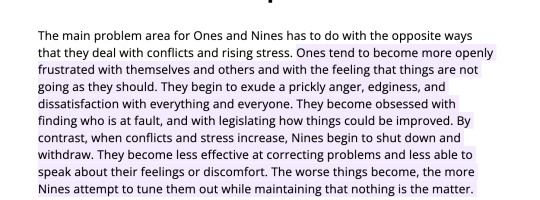
For Edwin, this perfectly captures his prickliness and snippiness in the first few episodes towards Crystal.
And for Charles, this lines up with his emotions (17)/reactions starting from episode 3 in the devlin house and how he tries to ignore his emotions and repress his anger
Lastly, on a more positive note, this part really describes their partnership and synergy perfectly:


I also think this ties in to Charles’s direction of growth — as a type Nine, Charles would look like a type Three in his direction of growth. Threes are described as adaptable, driven, and energetic (as well as attractive and charming). I think he exhibits all of these traits -- being friends with Edwin for the past 30 years has definitely supported Charles in this direction of growth.
Overall, I think all of this really speaks to how realistic and complex these characters are. If you read this whole thing, THANK YOU. I would LOVE to hear your thoughts on this, if you agree with these types, if you have any more examples you can think of in the show, if you think they fit better with a different type, etc.!! And if you’re interested in learning more about the Enneagram I’ll leave some sources below.
The Enneagram Institute website
The Sacred Enneagram by Christopher L. Heuertz
Sleeping at Last podcast feat. Chris Heuertz, about type One and Nine
One by Sleeping at Last
Nine by Sleeping at Last
references: 1 - @that-ineffable-devil 2, 5, 6, 7, 8, 9, 10, 11, 12, 14, 15 - @mellxncollie 3, 7 - @homoquartz 4, 13 - @nikossasaki 9 - @asidian 16 - @abeautifulblog 17 - @melefim
#dead boy detectives#charles rowland#edwin payne#dbd meta#payneland#dbda#edwin x charles#dead boy detective agency#long post#anyways i haven't even finished reading the book yet so I'm very likely going to find something else that I'll need to add to this#but i need to post this now so i'm not the only one going INSANE over this
61 notes
·
View notes
Text
Percy MC Introduction: Anja



more info & better image below the cut!

(all art by me!)
This is Anja (Ahn-yah) Niemi! Unlike Sunny (my summer MC), who is Deja’s roommate, Anja shares a room on-campus with Gwendolen (my fall MC; yet to be revealed). She is, in fact, my Percy MC — though they have a more one-sided-enemies-to-begrudging-lovers relationship. They’re soulmates at heart, though.

Extra fun facts:
Anja’s father is Finnish, which is where her first and last names are from, and her mother is Cherokee.
She has a singular elder brother, who is already out of college.
Anja and Sunny met in childhood and have been friends ever since.
She is uncomfortable with being touched by most people, but she makes exceptions for her close friends and family.
Anja gets her hair dyed by Winona (one of my OL:BA MCs)!
Anja is an ISTJ (MBTI).
Her birthday is December 23 — she is a Capricorn.
Her enneagram is 5w6.
Thanks for reading! If you want to see my other KF MCs, click these:
Spring MC; Summer MC; Fall MC
#keyframes vn#keyframes mc#keyframes fanart#keyframes percy#percy tozaki#perseus tozaki#teas ocs: anja
47 notes
·
View notes
Text
childhood of enneagram types
🔆Enneagram 7 : the enthusiast . ☆ . • ☆ . ° .• °:. *₊ ° . ☆



"the nurturer"/the mother of an E7 kid played a huge role. As a kid they were extremely sensitive to their bond with the mother (or the nurturer), its very likely that the child was cut-off from the mother's nurturing too soon & experienced a disconnection with their mother figure, the mother figure got occupied with other things very early in their childhood-- it can be the birth of an other sibling, an illness, career etc. ---if that was not the case then they were heavily influenced by the phase when they were learning to be more independent of the mother figure. It's possible that E7 kid had a good close relationship with the mother figure. Regardless of the quality of the relationship, the E7 kid felt the unconscious need to mother themselves , they understood very early in life that no one else is going to care for them, give them what they want, so they have to take care of themselves and get what they want. The kids dealt with the separation from their mother figure by focusing their attention on some other things outside of themselves-- toys, games, playmates, fantasies, plans, pleasurable thoughts etc. which occupied the child's mind and distracted them form the anxiety & painful feelings of separation. E7 adults often say that they had a good childhood but for the most cases it's their habit to see the brighter side of things - E7 children often idealize their parents because they want to believe their parents care for them so they can defend themselves against the pain of harsh reality & develop more of a fantasy relationship , many E7 say they experienced some dreadful events they didn't know how to deal with it as a child.
As an adult, how much they depend on distractions to get through life will depend on how deprived they felt in childhood.
#personality types#psychology#personality traits#enneagram#mbti#enneagram 7#childhood#children#inner child#enneatypes#psychoanalysis
52 notes
·
View notes
Text
Random headcanons: Curious-Hogleg siblings ver. 💥💥
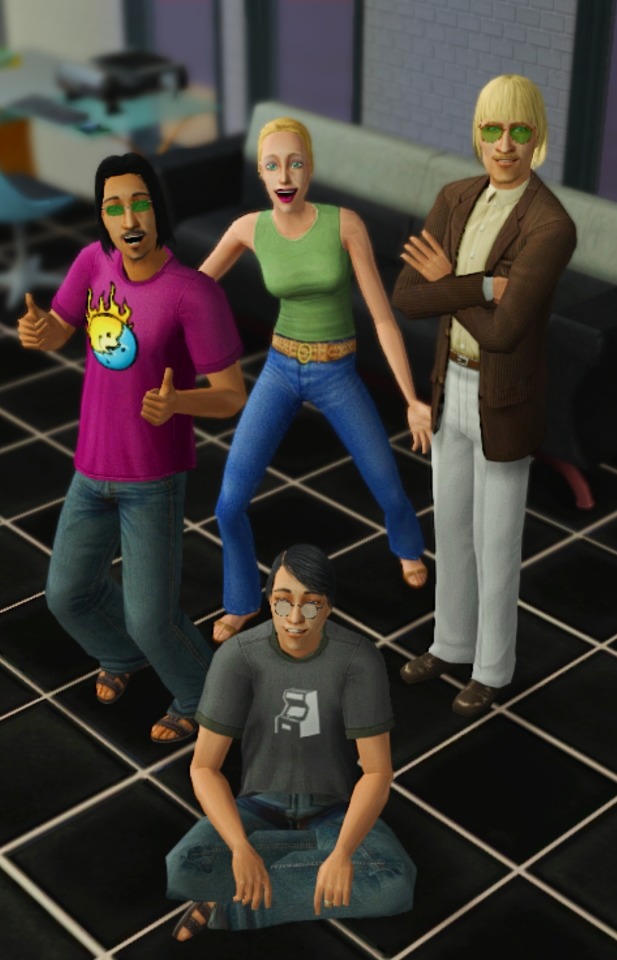
Names:
-Jenny's full name is Jenny Mary (Smith) Curious Hogleg, common ass name for a queen, she didn't want to burn her neurons by choosing her name.
-Pascal's full name is Pascal Galileo Curious Hogleg, he chose his name himself because 🏳️⚧️ and I feel that Pascal loves the names of famous astronomers and scientists in general, that's why Tycho is called Tycho, for Tycho Brahe.
-Vidcund's full name is Vidcund Charles Curious Hogleg because of Charles Darwin... Glarn named him.
-Lazlo's full name is Lazlo Johannes Curious Hogleg because I don't remember why, I think I read it somewhere and I liked it. Kitty named him.
Height (cm):
Jenny is 176 cm tall; Pascal is 163 cm tall; Vidcund is 178 cm tall; Lazlo is 175 cm tall. The shorty siblings
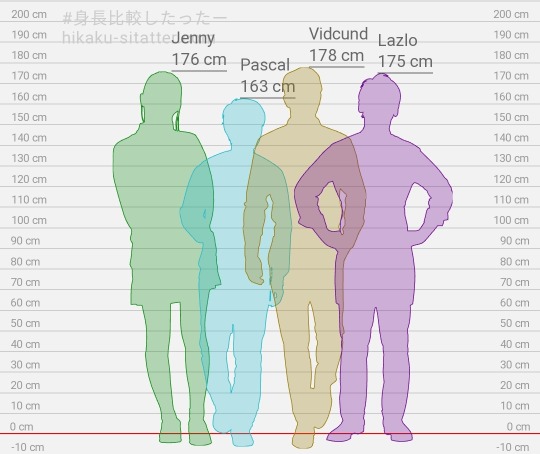
Age (2004) and birthdays:
-Jenny is 43 years old, she was born on May 16, 1961, Twinbrook, Simnation. (*)
-Pascal is 30 years old, he was born on October 30, 1974, Strangetown, Simnation.
-Vidcund is 29 years old, he was born on November 3, 1975, Strangetown, Simnation.
-Lazlo is 23 years old, he was born on December 11, 1981, Strangetown, Simnation.
(*) I'm not entirely sure about Jenny's age.
Sexual orientation and identity:
-Jenny is a pansexual panromantic trans woman.
-Pascal is an asexual biromantic trans man.
-Vidcund is a demisexual biromantic cis man.
-Lazlo is a bisexual biromantic cis man.
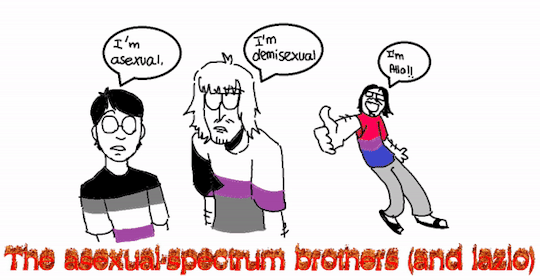
Personality (MBTI and enneagram):
-Jenny: ESFJ 2w3
-Pascal: INTP 5w4
-Vidcund: ISTJ 8w7
-Lazlo: ENFP 4w3
Random data:
-Jenny loves listening to the Backstreet Boys, when she lived with her brothers she always listened to them; Pascal, Vidcund and Lazlo pretended to hate the musical group, but occasionally hummed their songs.
-Jenny distanced herself from her siblings and family in general because Glarn did not accept her relationship with Pol Smith, she never understood why (and that's why the Curious brothers and her don't have such a high relationship).
-Jenny taught Vidcund about botany.
-Pascal knows how to play piano (basic), write and draw, when he doesn't do anything, he feels stressed. He is a bit pretentious, but because he was only flattered as a child for his achievements, as he grew up he learned to be calmer and control his ego.
-Pascal was Glarn's golden child.
-Pascal wanted to study psychology, but he knew that he was going to excel more in physics.
-Pascal wears retainers for his teeth at night.
-Vidcund wore braces throughout his childhood and teen ages, he used orthodontics until adulthood, and he had to use them again because he never used his retainers and his teeth returned to how they were before.
-Vidcund bleaches his hair, eyebrows and beard, his natural hair color is black.
-Vidcund went unnoticed by his parents (the curse of the middle child).
-Lazlo loves monkeys because he and Kitty watched Animal Planet together, also because Kitty was a biologist and brought pictures with images of chimpanzees and monkeys just for Lazlo.
-Lazlo has a good relationship with Sinjin because Sinjin took care of him as a child when Glarn and Kitty asked him to (Sinjin and Jenny are the same age).
-Jenny, Pascal and Vidcund can speak Tagalog, Lazlo never learned the language and sometimes his siblings use it to their advantage.
Songs that give me vibes to them:
-Jenny: Cementerio Club - Pescado Rabioso (because of the green color of the album cover); Estación - Sui Generis; Lovesong - The Cure.
-Pascal: Lago en el Cielo - Gustavo Cerati; Mil Horas - Los abuelos de la Nada; Starman - David Bowie.
-Vidcund: Devuélveme a mi chica - Hombres G; A estos hombres tristes - Almendra; Smells like teen spirit - Nirvana; Heart of Glass - Blondie.
-Lazlo: Salir de la Melancolía - Serú Girán; Lobo hombre en París - La Unión; Blue - Eiffel 65.
I would like to add more things but😏🛌💤
#what#my hcs#ts2#the sims 2#ts2 premades#the sims 2 premades#strangetown#the curious family#the curious-hogleg family#simblr#jenny smith#jenny curious#pascal curious#vidcund curious#lazlo curious#insane me
120 notes
·
View notes
Text
Arcane Characters as Enneagram Types
I’m going to start analysing the main characters of Arcane based on their Enneagram types. This will be kind of a masterpost with links to each character because it will be LONG haha. I’m starting with Vi but I will hopefully get around the others soon!
Summary:
I’m sure lots of people have heard of the Enneagram before but for those who haven’t: the Enneagram is a personality typing system based on the idea that the emotional wounds received/messages internalised in childhood shape how a person behaves and thinks as an adult. Based on this, it determines that people fit into one of 9 core personality types.
It’s not super scientific and is probably not recognised as being genuine in most psychology circles but it’s fun to analyse which little personality box your favourite characters fit into!

Some enneagram basics:
There are 9 core types based on the core fear/message internalised in childhood. While your personality traits may shift slightly as you grow and change as a person, your internalised beliefs/messages from childhood (i.e. your core type) does not change.
Each of the 9 core types can be divided into three subtypes based on instinctual goals:
Self-preservation types: Focus on issues related to survival and material security. Direct energy towards safety, security, avoiding danger, and maintaining wellbeing.
Social types: Focus on issues related to belonging, recognition and relationships in social groups. Driven to “get along with the herd” but also can be driven to achieve power or social standing in a group
Sexual/One-to-One types: Focus on issues related to the quality and status of relationships with specific individuals. Direct their energy towards maintenance of one-to-one connections, interpersonal attraction and bonding.
All three instincts are present in all people, but one will be dominant and shape the specific way their core type is expressed. The dominant instinct can change throughout the course of a person’s life as their priorities change.
This creates 27 possible subtype personalities, for example someone could be a Type 9 (Social), or a Type 9 (Self-Preservation) etc.
~~~~~~~~~~~~~~~~~~~~~~~~~~~~~~~
Okay! With that out of the way, here is my analysis of some of the main characters in Arcane. This is just my opinion and I’m not an expert by any means. Click on the links for an in-depth analysis.
Vi: Type 8 (Social)
Powder/Jinx: Type 6 (Self-Preservation [Powder], then Sexual/One-to-One [Jinx])
Jayce: Type 3 (Social)
Viktor: Type 5 (Self-Preservation, then Social once fused with the Hexcore)
22 notes
·
View notes
Text

Tang Tian ♡ˎˊ˗ | Confectionary for the Z-Fighters (DBS Era)
art credit to @ taidaken on instagram note: this is her design & appearance ref for Dragon Ball Super. Still waiting / working on her earlier designs.
Name: Tian Tang (Tang Tian) Nicknames: Tang Tang, Tangy Height: 5’1 (155cm) Ethnicity: Chinese Species: Human Age: 43-49 (DBS), 25-39 (DBZ), 14-20 (DB) Birthday: February 14, 737 Zodiac: Aquarius Gender: Cis female Sexuality: Panromantic Demisexual Blood Type: B Status: Alive Occupation: Heir to the Tian Family’s Pastry & Confectionary Shop + Baker to the Z-Fighters & especially Lord Beerus Parents: Gāodiãn Tian (father) & Caomei Tian (mother) Romantic Interest(s): Lord Beerus, Lord Frieza MBTI: ESFP Enneagram: 7w6 Power Level: 120 (T1) TBD (T2, being trained by Frieza)
keep reading under the cut for more detailed info <3
Importantෆ
Overall I have 2 ‘timelines’ for her. Her main timeline ties directly to the main anime/manga timeline, in which she ends up shipped with Beerus.
While the timeline she’s shipped with Frieza directly runs with her Beerus timeline, the timeline splits following the Tournament of Power– where instead of staying with Beerus and her friends all the time, she accompanies Frieza with the Frieza Force.
For organizational purposes, each timeline is numbered.
Tang’s main timeline, where she is with Beerus is T1.
The timeline that splits off that one, where she ends up with Frieza is T2.
Fun Factsෆ
Her power level is explained by her childhood in the wilderness + training from Tien Shinhan at multiple points through the series to acclimate her power level just below Chi-Chi’s.
Tang's full name means 'Sugar Sweet' or 'Sweet Sugar'
Her parents' names also follow the naming rule Toriyama placed
Tang is the inventor/creator of the ‘Z-Boosting Cupcakes’ as she calls them, which are an alternative to the food pills Capsule Corp. supplies with extra. Said alternative offers the same kind of boost as a food pill (ie, full stomach, increased stamina, replenished health, etc.) but instead of either a flavorless or bitter food pill, in the form of a sugary sweet cupcake. Each different flavor provides a different power boost type. They kick in quicker than food pills but do not last as long – requiring more cupcake consumption.
In the anime/manga, she would be nothing but a supporting character. In any game, only an add-on or support type.
Her role in Beerus’ life is both as a romantic partner and unofficial attendant of some sort. Similar to Whis, she lives on his planet and carries out duties to keep the Destroyer God happy. Some examples include the sorts of chores Vegeta and Goku do when training there, as well as cooking and cleaning overall to allow Whis more time to relax.
With Tang’s role as his ‘unofficial attendant,’ Tang is allowed to accompany Beerus almost anywhere he pleases.
When shipped with Frieza, Tang is simply referred to by the Frieza Force soldiers as 'Lord Frieza's Companion,' and is never supposed to experience disrespect from them.
By Super, Tang has used one Dragon Ball wish. She requests Shenron bestow her with knowledge of every written culinary recipe on earth, but she knows there are recipes out there that are unwritten and unknown to her, which drives her to try to create her own.
Sometime following the Broly Arc, Tang begins to be trained by Frieza in the timeline where she is shipped with him. Her power level in this timeline is undetermined due to how powerful Frieza is and dependent on how much she is capable of as is.
Info For All Timelinesෆ
She doesn’t know who her birth parents are, and from as early as she can remember, she had lived deep in Mount Paozu until a man found her. She’d grow to call him Father, a kind bakery owner traveling through the mountains on a delivery run named Gāodiãn Tian.
Shortly after Bulma and Yamcha broke up, Tang and Yamcha began to date after he regularly visited her family business. However, a similar fate befalls them when Yamcha’s unfaithfulness becomes even too much for Tang as it did Bulma.
This brings the two women closer, and Bulma and Tang relate with one another. They spend ‘girl time’ together complaining about boys and whatever other nonsense comes to mind.
(eventually, i'll upload the complete list / writing I have for all of Tang's appearances or how the anime would be different with her presence. it's currently being worked on more than halfway through DBS and working backward to DBZ next and then DB.)
Personalityෆ
Positive Traits: Ambitious, Optimistic, Sweet, Respectful, Gentle, Energetic, Playful, Silly, Imaginative, Innocent, Simple, Curious, Supportive, Nurturing, Obedient, Friendly, Wholesome, Generous, Charming, Efficient, Passionate, Affectionate
Negative Traits: Dimwitted, Naive, Overly-Trusting, Too-Forgiving, Ignorant, Childish at times, Spoiled, Foolish, Gullible, Careless
Likes
Beerus
Frieza
Piccolo
Baking
Watching Martial Arts Tournaments (or similar things)
Making Food For Others
Climbing Trees
Mountain Climbing
Sunny Days
Space
Good Hygiene
Giving Gifts
“Strong People.” – Tang
Tails (She just thinks they’re neat)
Dislikes
Thunderstorms/Rainy Weather
Close Toed Shoes
Frost (“Off-brand Frieza from Universe 6”)
“All that high-tech stuff Bulma does.” – Tang, probably.
Making Clothes (She can, but hates to)
Sewing
Sleeping in the woods/any type of camping or “roughing it”
Training (herself, she likes to watch her friends train)
Bitter or Bland Food
#oc: tang tian#oc: tang#dragon ball oc#dbz oc#dragon ball super#dbs#dragon ball z oc#oc art#original character#ocs#oc#dragon ball#dragon ball z#oc reference#oc artwork#oc info#oc intro#oc bio#oc biography#original character oc#original charater art#oc story#commissioned art#fictional other#oc x f/o#dragonball#dbz#oc ship#oc drawing#oc tag
21 notes
·
View notes
Text
Anon wrote: Hi, I’m a 23 year old INFP. Due to childhood trauma and growing up in an abusive household, but ultimately I suppose due to my own personal struggle to take control of my life, I feel very behind and unaccomplished at my age. I have yet to finish my degree. I managed to get through high school with flying colours, but it turned out I was completely incapable of managing my depression and focusing on school at the same time. As a result, I’ve dropped out for the time being (I’m about halfway done) and have decided to focus on managing myself, personal development, and getting my finances in order before continuing school.
I feel a lot of shame and guilt for not completing school on time, as I’ve always seen myself as “smart” and “scholarly” I suppose, and was raised to hold education in high regard. To put things into perspective a bit more, I’ve always struggled with procrastination, getting things done on time and allowing my emotions to completely captivate me to the point where I easily neglect my duties. Despite this, I managed to get through high school as an outstanding student, but like I said earlier, this did not carry on into college unfortunately.
I feel like I’m less than half of the person that I could be. I also feel held back by my typology. I recall that you don’t hold much regard for enneagram, but I will just say being an INFP 4, it feels like I was born as the type most susceptible to failure. Now, I know INFP does not equal failure, as my best friend is also one and is a relatively successful business woman. However, she has things in life that I severely lack; adequate parental guidance, self esteem, and what I’d describe as much more developed Si. This isn’t to say things were handed to her, she worked for a lot of what she has now, but I do think that she was blessed with much more assets than I was.
I guess what I feel is that INFP is the least useful brain to have in a situation like mine. I have not a logical mind, nor a desire for any sort of order like Js do, and on top of that I was not taught any life skills, and all of my emotional intelligence was developed on my own, through observation. So, I’m great at giving advice, and horrible at applying it to my own life. I’ve been said to be wise, insightful, and particularly good at dissecting interpersonal relationships, yet nothing about my situation in life would reflect this, except maybe my relationships I have with my friends, to a degree.
I know I lack emotional intelligence despite being told otherwise, and this is something I’ve only recently come to terms with. I now believe if I truly had emotional intelligence, I would be in a better position than I am now. I have a tendency to avoid things that make me feel bad. I enjoy staying up late and staying in bed all day. I feel very unequipped to deal with society. I hate strangers, I hate being yelled at, I hate being invalidated, I hate being misunderstood, and all of these hatreds and my incompatibility with society were solidified during the years I worked (fast food, sales, and call centers). I am now very hesitant to get a job, I feel like I’ll be unable to succeed at anything I’m actually qualified for, as it often requires dealing with strangers. I don’t know how I did it before, but I do remember feeling dread during every work hour. I am scared to be in that position again.
I have a tendency to do more for others than myself. I’ll spend all day or longer writing an essay for a friend, or helping them with their homework, and yet I cannot bring myself to focus on my own studies. I can give a friend mountains of advice, perhaps even a detailed life plan, but I can’t begin to truly dissect my own problems and figure something out. It is so much easier engaging with someone else’s problems instead of my own. These days, I often feel like some sort of side character, someone meant to uplift others, but cannot experience any development for themselves. The narrative isn’t focused on me, although I so desperately want it to be.
I want to be accomplished. I want to be strong. I want to face strangers with ease. I want to be able to push aside my feelings in order to work hard. I want to be comfortable with myself, to be a beacon of hope for others, not just by my words and ability to connect with others, but by who I am as a person on my own.
But I am so inconsistent in my pursuits of self improvement, and so easily defeated. I’ve tried and failed a million times. I’ve improved myself over time, but the improvement has been minuscule and inconsistent. It isn’t entirely my fault, as there are circumstances I won’t get into that quite literally force me away from my goals, but I know that I need to find a work around and learn to cope with them so that I may one day succeed and leave these circumstances.
I just don’t know what to do. How can such a sensitive, reclusive, and traumatized person such as myself break their chains? Is it even possible to live up to the greatness I desire that lives only in my head? As an INFP born into such unlucky circumstances, am I destined to always fall short of the person I need to become?
My friends tell me that I’m a great person. They would say I’m capable and that they’ve seen proof. I am cursed with the knowledge that they speak with bias, and their perceptions of me are not based off reality, but by subjective feelings of tenderness. I feel like if anything, it’s been proven that I am incapable.
The only thing I’m really “good” for is giving emotional support to others, but that means nothing to society and absolutely nothing to myself. When I say this, I don’t mean to say that I don’t value kindness or the ability to connect, but that these “strengths” of mine do not realistically benefit my life. Being empathetic is nice for others who know me, but it hasn’t made me a more accomplished or skilled individual, and it hasn’t added any pride to my image. It doesn’t mean much to me if in the end I still can’t take care of myself and I still don’t have much value as a member of society. Especially when I look around and see how much more accomplished my peers who are much more insensitive than me are.
How do I change? How can I live up to my own expectations and standards? How do I fight back?
----------------------
You've brought up a lot of different points, so I'll attempt to break them down for you:
(1) Type Clarification: How did you come to INFP and are you certain this is the correct type? I am obliged to clarify this point because function development isn't going to work for you unless you have the correct type. Generally speaking, based on my experience with type assessment, there are certain warning signs that indicate a mistype, and you display a few of them, so it's important to double check before proceeding.
(2) A Problem of Perspective: What you've written is basically a narrative of your life that explains how you got to this point. What you don't seem to understand yet is that a "narrative" isn't reality. A narrative is merely a story that is told from a very narrow and specific point-of-view.
I always like to bring up the children's story The Ugly Duckling as an example of how a personal narrative can heavily influence one's perspective and lead one into forming faulty beliefs about oneself and the world. The main character of the story wasn't able to truly understand himself until he realized that his personal narrative was all wrong. You are in a similar boat.
Whether they realize it or not, everyone has a personal narrative, a story that they tell themselves about who they are. How do we know whether the narrative is a good one? Think about what a narrator does in a novel:
- A story always makes more sense and is more easily understood when the narrator isn't the main character but rather an omniscient or godly being that tells the story from an objective vantage point (third person perspective). As such, we can trust that the narrator is providing a full and factual account.
- When the narrator is the main character (first person perspective), you will find that the story is more difficult to understand for two reasons: 1) there is a lack of information due to lack of access to other perspectives in the story, and 2) readers must suffer the same distortions in belief and flaws in memory that the character suffers.
Knowing this, I will point out two problems with your narrative...
(3) Lack of Objectivity: The first problem with your narrative is that it is stuck in the first person perspective. You very much lack a bigger picture view of things, which is not an uncommon problem for introverts who struggle with tertiary loop. This is a sign of insufficient extraverted development, i.e., trapped in subjectivity and lacking objectivity. You're unable to see yourself and your situation from any other perspective but your own, to the point where you actively dismiss every other valid perspective.
Lack of bigger picture thinking is often correlated to depression. Your mind basically operates as though having fallen into a pit, with no view of anything but yourself. Spend enough time being stuck with yourself and every little thing that flits through your mind gets amplified manyfold, such that every ache and pain feels much larger than it really is.
If you are INFP, this situation should be remedied through auxiliary Ne development that would grant you a more open-minded, optimistic, resourceful, ambitious, and forward-thinking attitude. It's not about "shoving your feelings aside" but about learning to see things in a more positive light. The cure to being too negative is to learn how to balance it by being more open to the positive.
Healthy NPs never shy away from problems because they trust in Ne, i.e., they exercise their creative problem solving skills as necessary to get over hurdles and obstacles, even transforming them into something positive. So, why aren't you exercising Ne? What have you done to develop Ne? It is troubling (and perhaps a sign of being mistyped) when the auxiliary function is completely absent from your cognition.
(4) Poor Critical Thinking: The second problem with your narrative is that it was spun out of faulty beliefs. You've basically been telling yourself a bogus story, over and over again, and now you believe that every word is true. When a narrative is fundamentally flawed like this, the remedy is to change the story and make it more objective as mentioned above in point #3, as well as more factual.
While there are facts peppered throughout your story, your interpretation of the facts is often incorrect. You want to believe you have a good grasp of the facts, but you don't.
For example, the fact is that the education system, being as big as it is and not having all the resources in the world, cannot be much more than a crude one-size-fits-all approach to learning. As such, it's not going to work equally well for everyone. There are always going to be students with special needs or unique circumstances that won't flow smoothly through the system as planned. If the system isn't working for you, is it something to take as a personal failure and feel deeply ashamed about?
I used to teach critical thinking courses and there was one problem I encountered again and again. Many people think they understand facts, but the truth is that they don't even have basic knowledge of what a fact is.
For example: Yes, it is a fact that you were deprived a healthy childhood. Yes, it is a fact that you had to drop out of your studies. These things happened and they are provable. However, how did you jump from these simple facts to make claims such as "I'm a failure"? Calling yourself a failure isn't a fact but rather a value judgment, and in this case, it is an unjustified value judgment.
An easy way to tell whether someone has poor critical thinking skills is to see whether they can tell the difference between a fact and a value. You aren't able to, and many people aren't able to. Believing that you have a good grasp of the facts when you actually don't is how you end up with faulty beliefs. When you go through life with faulty beliefs, you're much more likely to take the wrong approach, make errors, and suffer from unconscious biases and prejudices.
People aren't born with good critical thinking; it must be learned and practiced. There are lots of resources for improving, and you ought to improve because it's vital for challenging faulty beliefs. However, deeply entrenched beliefs are difficult to change on your own because your ego is invested in them, so it might be a good idea to work with a cognitive-behavioral therapist. They can be your objective party and help point out exactly where your thinking is going wrong. But this is assuming that you're willing to open your mind to other perspectives.
(5) Emotional Reasoning: Yes, you are quite right that you need to improve your emotional intelligence. Throughout your story, I see many thinking errors that lead you to draw incorrect judgments/conclusions. But what lies at the heart of those errors is that your thought process frequently gets hijacked by unresolved negative emotions. Improving your emotional intelligence would not only help improve your mood, it would also help stop emotional reasoning.
In your story, you're trying to link cause and effect, in order to provide an explanation of the factors that led you to this point in life. This seems like a reasonable and logical thing to do. However, people who are prone to emotional reasoning often get cause and effect backwards or misattribute causes. When they're feeling bad, they concoct a story to explain and justify their negative feelings. In effect, they start with a conclusion and then selectively gather evidence to support it, which is backwards from proper logical reasoning that should start with the evidence and then draw the most logical conclusion from it.
For example, you claim that the only thing you're good for is providing emotional support, which implies that you're good at it. How can we prove this statement? One way would be to examine the results of the support you've given. Did people appreciate the support? Did it help them? Did it change them? If so, you can be said to be good at it.
But apparently what they say doesn't count as evidence. Somehow only you have access to the real evidence. Don't you find it odd that so many of your thought processes come back to you having some magical ability to access a deeper truth that others can't see? You call yourself a failure who is unable to do anything right on one hand, but then insist that you couldn't possibly be wrong when it comes to assessing yourself, on the other hand. This is the kind of contradictory thinking that emotional reasoning gets you mired in.
If being able to empathize isn't a skill, valuable both to oneself and others, then all the great friends, parents, caregivers, educators, coaches, doctors, nurses, vets, counselors, therapists, social workers, artists, musicians, writers, librarians, gardeners, and zookeepers should just delete themselves for their utter uselessness to society. Heck, I should just delete my whole blog right now because I don't get anything from writing this for you, yes?
There are absolutely personal benefits to be had from being empathetic. Through supporting and helping others, you can experience:
the dignity of choosing to be an honorable/humane person
the intimacy of deep and meaningful relationships
the satisfaction of reaping the fruits of your emotional labor
the joy of making a positive difference in the world
the awe of witnessing the realization of greater potential
It seems you can't recognize these benefits because they contradict the failure narrative and the negative emotions you're struggling with. Any evidence that makes you feel good about yourself must be rejected, right? Isn't it odd that you've closed off every path to feeling good about yourself except an impossible one, i.e., living up to some imaginary standard of what you believe all people your age should be? It's almost as though you are intent on believing the worst about yourself, so you set yourself up for failure with unreasonable expectations. But this is emblematic of how emotional reasoning messes up the mind.
People aren't born with great emotional intelligence. It's yet another thing you must learn and practice throughout life, that is, if you don't want your emotions to be out of your control. It doesn't matter when you start learning; it only matters that you start.
(6) Changing the Narrative: There are distinct patterns in our personal narratives, which Jung conceptualized as archetypes. Understanding these patterns from a more objective vantage point can help us craft a narrative that serves us better. At the end of the day, you are the one narrating the story, and you could choose to tell a different story at any time.
To give you an example, if I were to analyze your narrative, I'd say that your perspective is that of an "orphan". Orphans see themselves as rejected children, so their approach to the world is one of neediness for love but also deep resentment/anger about being abandoned. Orphans are prone to feeling: unmoored, confused, ashamed, helpless, hopeless, apathetic, fatalistic.
Of course, it's appropriate to feel: unmoored when you don't have a safe and stable home base to operate from; confused when you don't have enough social support; ashamed when you struggle more than others; helpless when you don't know what to do; hopeless when every attempt fails; apathetic when you get disappointed too many times; fatalistic when the odds seem stacked against you.
Nobody is saying that your feelings are invalid. What matters most is how you interpret the feelings and what you do about them. The problem is that, through emotional reasoning, you take your negative feelings and turn them into cynical judgments and then make decisions that leave you perpetually feeling like an orphan.
A narrative becomes sinister when one starts to derive some kind of egotistical benefit from it, which then breeds resistance against changing it. Are you willing to change your narrative at this point?
For example, many orphans keep telling the orphan story because it allows them to benefit from victimhood. Being a victim has its "perks". Victims have the right to self-pity. They have the right to rage against whatever they feel victimized by. They can also expect special treatment or extra care. As such, you will find that orphans often reject love and stay orphans in the end because they don't want to give up the "perks" of victimhood.
I'm not saying this example applies to you, but have you reflected on why you have a pattern of rejecting people's attempts to console you and provide you with evidence that you are actually a good and worthy person? Have you reflected on why you insist on telling the orphan story when other narratives are readily available to you?
For example, you could choose the "misfit" narrative. There are plenty of people, often INFPs, who march to the beat of their own drum and carve out their own unique path to success in life. Or, you could choose the "creator" narrative. INFPs generally love to use their imagination to come up with new and novel ways to live life outside the box. Why is it that you believe there's only one path available to you, that life is only about living up to society's unimaginative standards?
Or, you could embrace the "caregiver" narrative. It could be quite a heroic story, and it might lead you into a very meaningful and fulfilling career. Caregivers change people's lives for the better, which drives tangible and positive societal change. Yet, you reject this story and call caregiving worthless because you believe it is a "weakness" easily exploited. People mistreating you isn't something for you to be ashamed of. It is the perpetrators of abuse that ought to be ashamed and punished for their immoral behavior. How long are you going to keep punishing yourself for someone else's problem?
With regard to dealing with people, it sounds like you haven't learned about healthy boundaries. Boundary setting is a practical problem that can be addressed with practical solutions. Yet you turn it into some kind of grand existential crisis and make sweeping statements about the world. Do you really want to spend your whole life locked away, living in fear? It might feel good right now because it's safe, but in the long run you will actually be wasting away for not challenging yourself to reach your greater potential.
.
I'm not saying that any of these problems are easy to resolve. But these problems shouldn't be viewed in the traditional sense of needing a "fix" or that something is "wrong" (with you). These kinds of problems I've outlined are actually spiritual calls to change and improve. How do you change? It is through confronting what we lack and what we are afraid of that allows us to grow as human beings.
How can you live up to your own expectations and standards? Maybe a better question to ask is whether you've set the right expectations and standards? If you don't want to always feel bad about yourself, then you have to get up and start doing the things that will lead you to feel better about yourself. And we each have our own path to take to developing self-esteem and self-worth. Once you understand and respect your own individuality, then maybe you can exercise more self-compassion and allow yourself to live and learn at your own pace.
How do you fight back? I don't think it's necessary to "fight". Would you yell and scream and dump a flower in the trash just because it didn't grow as fast as the other seeds you planted? No, hopefully you would give it extra care to ensure that it has everything it needs to grow well. That's how you should be treating yourself. If you didn't grow up in an environment that taught you good life skills, then it is incumbent upon you to learn them as an adult, for the sake of your own well-being.
Life has enough challenges; you don't need to be fighting yourself. Instead of wasting time dwelling in fatalistic narratives, see yourself as a human being who is capable of learning and adapting. Learn to treat yourself well and cut out the noise to focus primarily on picking up the knowledge you need to progress in life, not just academics.
#self esteem#self worth#self compassion#failure#making mistakes#critical thinking#emotional reasoning#ask
24 notes
·
View notes